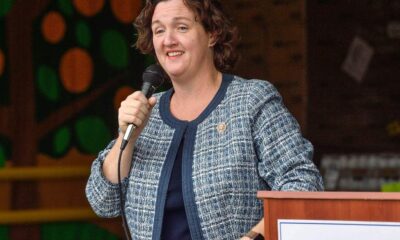The city commissioner, who has been a leading voice in Huntington Beach’s long-standing fight for local control, enters the race with an impressive slate of endorsements.
Butch Twining, a city commissioner and resident of nearly six decades, has announced his candidacy for Huntington Beach City Council.
“My decision to run for City Council is driven by my love of this city,” Twining said. “I’ve watched other councils chip away at all things that have made our city the greatest coastal small town in California. In 2022, the voters said “enough”. In 2024, it’s our opportunity to drive this message home by electing me to the City Council, to sit alongside the majority to ensure and complete the image our city was always known for: a beautiful, safe and accepting coastal community.”
Twining is running as a slate with two other candidates—Chad Williams and Don Kennedy—dubbed the ‘HB3.’ The candidates have a robust host of endorsements of Huntington Beach Mayor Gracey Van Der Mark, Mayor Pro Tem Pat Burns, Councilman Tony Strickland, Councilman Casey McKeon, State Senator Janet Nguyen, Assemblywoman Diane Dixon, Congressional candidate and former Assemblyman Scott Baugh, the Orange County GOP, and the Lincoln Club of Orange County.
Twining’s professional background includes serving as President of one of California’s leading geotechnical engineering, materials testing and inspection companies. He explains that his goal in running is to “bring his 45 years of business experience, budget management, fiscal responsibility, strategic partnerships and planning experience to the Huntington Beach City Council and the City of Huntington Beach.”
During his time on the city’s Planning Commission, Twining has joined the Council’s conservative majority in the fight to preserve local control and push back against overreach from the State. Last year, when Huntington Beach was gearing up to challenge California’s “builder’s remedy” law—which allows developers to ignore zoning codes in order to build high-density affordable housing units—Twining was a leading voice in the fray.
“The builder’s option is bullying by the state to either pass a housing plan that they’ll approve,” Twining said at the February 14, 2023 meeting. “I don’t want to see developers just come in here and build wherever they want, whatever they want.”
Days later, the City Council voted 4-3 (along Party lines) to permit City Attorney Michael Gates to challenge the housing state laws, prompting a lawsuit from the State. While left-leaning cities within Governor Newsom’s home county of Marin were allowed to enjoy moratoriums on affordable housing building requirements, the crackdown on conservative Huntington Beach has been intense—and, for the Governor, personal.
“Huntington Beach is a unique suburban beach community comprised of 29 square miles and is currently 95% developed. The High Density development mandates from Sacramento are incompatible with our city and is politically-motivated,” says Twining. “We cannot maintain the quality of life we enjoy here in Huntington Beach with High Density Developments being forced upon us. The increased traffic, parking and environment issues would have a lasting and negative impact on our community.”
Twining’s other political priorities include, according to his campaign website, finding solutions to homelessness, reducing red tape, attracting businesses, and—most of all—promoting public safety.
“My highest priority is to ensure our community is safe and secure,” Twining said. “Thus, I unquestionably support our first responders, in the Huntington Beach Police, Fire and Lifeguard departments [who] are amongst the best in California. I am committed to provide the required human and physical assets to protect and serve all of the citizens of Huntington Beach.”
Like all Huntington Beach City Council candidates, Twining is running a citywide campaign for an at-large position. Despite threats of lawsuits from activist lawyers who seek to change how its municipal elections are conducted, Huntington Beach is still the largest city in Orange County that remains undistricted.
Twining’s Democrat challengers include the three sitting incumbents—Rhonda Bolton, Dan Kalmick, and Natalie Moser—as well as former Councilwoman Kim Carr, who lost her State Senate race last cycle to Janet Nguyen, and gay event planner Cody Cleary.


 Environment3 years ago
Environment3 years ago
 Community3 years ago
Community3 years ago
 Uncategorized2 years ago
Uncategorized2 years ago
 Uncategorized12 months ago
Uncategorized12 months ago
 Community3 years ago
Community3 years ago
 Uncategorized3 years ago
Uncategorized3 years ago
 Community3 years ago
Community3 years ago
 Community3 years ago
Community3 years ago






